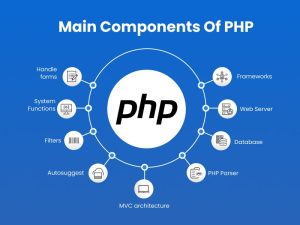In the realm of website development, PHP stands out as a powerful and versatile scripting language. Its influence in creating dynamic, data-driven websites has endured for decades, and its capabilities continue to make it a preferred choice among developers. Here’s a closer look at the power of PHP and why it remains a cornerstone in the web development world.

1. Server-Side Scripting
PHP, which stands for Hypertext Preprocessor, is primarily known for its role in server-side scripting. Unlike client-side languages like JavaScript, PHP is executed on the server, generating HTML that is sent to the client’s browser. This server-side execution allows for more secure and efficient data processing. PHP can interact with databases, handle form submissions, and manage session data, making it ideal for creating complex, interactive web applications.
2. Database Integration
One of PHP’s standout features is its seamless integration with databases. PHP is compatible with various database systems, but it is most commonly used with MySQL. This synergy allows developers to build robust and scalable web applications, from simple content management systems to large e-commerce platforms. PHP’s ability to perform CRUD (Create, Read, Update, Delete) operations efficiently makes it indispensable for data-driven websites.
3. Flexibility and Compatibility
PHP is known for its flexibility and compatibility with various operating systems and web servers. Whether you’re using Apache, Nginx, or IIS, PHP can be configured to work seamlessly. It supports a wide range of platforms, including Windows, Linux, and macOS, and is often bundled with popular software stacks like LAMP (Linux, Apache, MySQL, PHP) and WAMP (Windows, Apache, MySQL, PHP).
4. Extensive Framework Ecosystem
PHP boasts a rich ecosystem of frameworks that accelerate development and enhance productivity. Frameworks like Laravel, Symfony, and CodeIgniter provide pre-built modules and libraries that streamline common tasks, such as routing, authentication, and database interactions. These frameworks also promote best practices in code organization, security, and maintainability.

5. Strong Community Support
PHP’s long-standing presence in the web development community has resulted in a vibrant and supportive user base. This strong community support translates into a wealth of resources, including documentation, forums, and tutorials. Developers can find answers to their questions, share knowledge, and contribute to a collective pool of expertise.
6. Cost-Effectiveness
As an open-source language, PHP is freely available, which significantly reduces development costs. The lack of licensing fees and the abundance of free tools and resources make PHP a cost-effective choice for businesses and developers alike. This affordability, combined with its robust feature set, has contributed to PHP’s widespread adoption.
7. Ease of Learning and Use
PHP’s syntax is relatively straightforward, making it accessible for beginners and experienced developers alike. Its ease of learning and use allows developers to quickly grasp core concepts and start building functional web applications. The language’s simplicity also means that developers can focus more on solving problems and less on wrestling with complex language constructs.
8. Continuous Evolution
PHP is not a static language; it continues to evolve with each new version. The PHP development team regularly releases updates that introduce new features, improve performance, and enhance security. This commitment to evolution ensures that PHP remains relevant and capable of meeting the demands of modern web development.
Conclusion

The power of PHP in website development is evident in its ability to handle server-side scripting, integrate with databases, and support a wide range of web technologies. Its flexibility, extensive framework ecosystem, and strong community support make it a reliable choice for building dynamic, data-driven websites. Whether you’re a seasoned developer or just starting, PHP’s enduring relevance and continuous evolution ensure it remains a key player in the world of web development.


